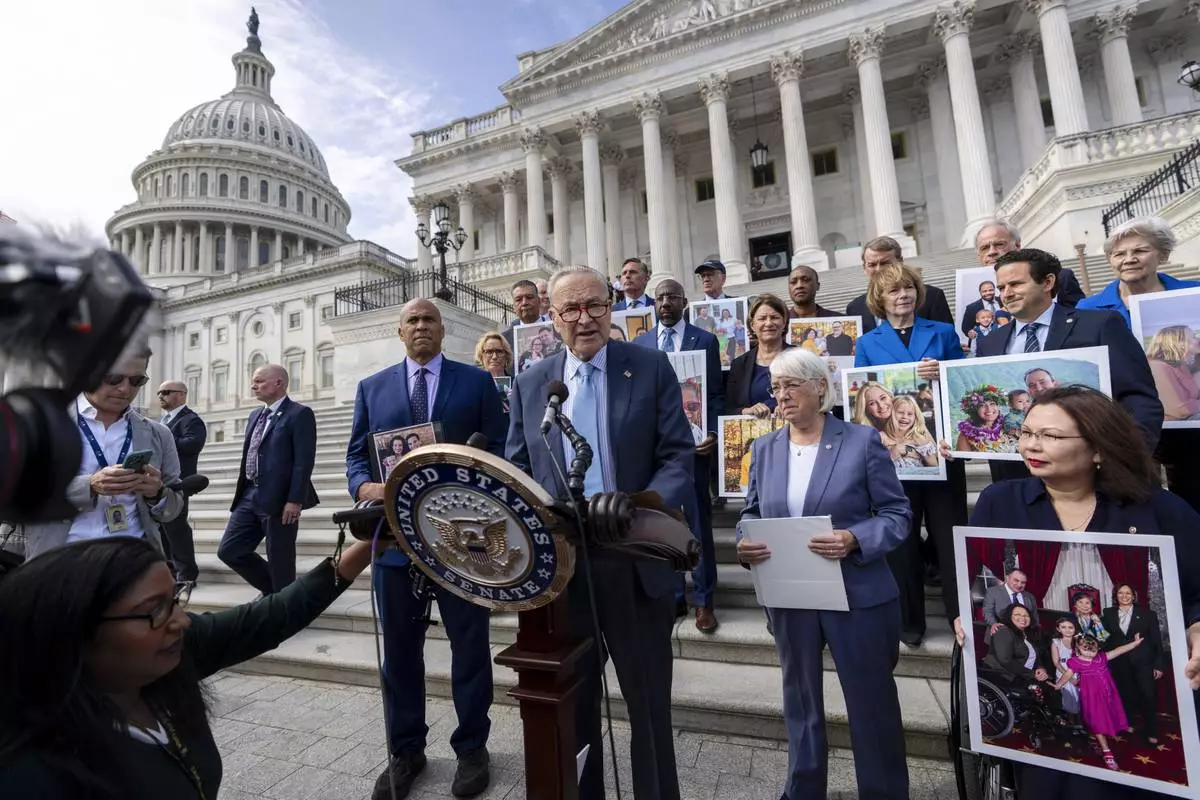APPLE VALLEY, Minn. (AP) — A pair of rare Amur tiger cubs are making their public debut at the Minnesota Zoo, raising hopes for preserving an endangered species that's native to far eastern Russia and northern China.
Andrei and Amaliya got to venture outside and feel the grass of their new home under their paws Wednesday for the first time since their 12-year-old mother, Dari, gave birth on May 23.
“They’ve done quite well since then," zoologist Trista Fischer said. "We’ve monitored them very closely. Dari’s been fantastic. She’s provided outstanding maternal care. And so today we’ve reached the point where they’re fully vaccinated and they’re now about 40 to 45 pounds (18-20 kilograms).”
Scientists estimate the Amur tiger population is just around 400 to 500 in the wild. They were near the brink of extinction in the 1930s and 1940s but have recovered somewhat since then. It's tricky to breed them, and around one in four Amur cubs don't make it to adulthood, whether it's in the wild or in captivity, she said. Poachers are another major threat.
But the Minnesota Zoo, located in the Minneapolis suburb of Apple Valley, has a long history of conserving tigers. Its Amur tigers have produced 57 cubs, 46 of which survived for at least 30 days. Of those 46, 21 have gone on to produce litters of their own, amounting to another 86 cubs. The births of Andrei and Amaliya raised the zoo's population to seven Amur tigers, including their sire, Luka.
Fischer is the leading coordinator for the Tiger Species Survival Plan, a breeding program in the United States with facilities in other countries that works on a global level to preserve the big cats. The plan manages three groups of tigers: Sumatran, Malayan and Amur.
“This litter is so valuable to the population right now,” she explained, saying the genetic diversity of heathy tigers in human care could someday be used to help support populations in the wild.
Zoo spokesperson Zach Nugent said the cubs will remain housed together with their mom for about 18 months, before Andrei, the male, is moved to separate housing, around the same time a male cub in the wild would start venturing out on his own. Amaliya, the female, may spend a little more time with Dari, up to 24 months. Then Fischer will determine whether either cub should be bred, and potentially moved for that to another accredited zoo, which typically happens after the cubs are 2 years old.
“Aww, I love when they get their little Yoda ears,” Fischer said referring to the pointy ears of the Star Wars character as she watched Amaliya and Andrei explore the new terrain of their enclosure. She said it was an emotional, exciting and proud moment for her and her team.
“Our work’s not over, but all that work so far is really paying off in how well that these cubs are acclimating to a new surrounding, pretty much immediately," she said as the little tigers roamed outside with their mother. "They’re showing a lot of resiliency, which is something that we work hard for in human care. We want these animals to have a lot of confidence and be able to adapt to new environments just as they’re doing today.”
Karnowski reported from Minneapolis.

Three-month-old Amur tiger cubs Amaliya explores her outdoor enclosure for the first time with her mother Dari at the Minnesota Zoo in Apple Valley, Minn. on Wednesday, Sept. 11, 2024. (AP photo/Mark Vancleave)

Three-month-old Amur tiger cubs Amaliya and Andrei explored their outdoor enclosure for the first time with their mother Dari at the Minnesota Zoo in Apple Valley, Minn. on Wednesday, Sept. 11, 2024. (AP photo/Mark Vancleave)

Three-month-old Amur tiger cubs Amaliya explores her outdoor enclosure for the first time with their mother Dari at the Minnesota Zoo in Apple Valley, Minn. on Wednesday, Sept. 11, 2024. (AP photo/Mark Vancleave)
WASHINGTON (AP) — Republicans have blocked for a second time this year legislation to establish a nationwide right to in vitro fertilization, arguing that the vote is an election-year stunt after Democrats forced a vote on the issue.
The Senate vote was Democrats’ latest attempt to force Republicans into a defensive stance on women’s health issues and highlight policy differences between Vice President Kamala Harris and former President Donald Trump in the presidential race, especially as Trump has called himself a “ leader on IVF.”
The 51-44 vote was short of the 60 votes needed to move forward on the bill, with only two Republicans voting in favor. Democrats say Republicans who insist they support IVF are being hypocritical because they won't support legislation guaranteeing a right to it.
“They say they support IVF — here you go, vote on this,” said Illinois Sen. Tammy Duckworth, the bill's lead sponsor and a military veteran who has used the fertility treatment to have her two children.
The Democratic push started earlier this year after the Alabama Supreme Court ruled that frozen embryos can be considered children under state law. Several clinics in the state suspended IVF treatments until the GOP-led legislature rushed to enact a law to provide legal protections for the clinics.
Democrats quickly capitalized, holding a vote in June on Duckworth's bill and warning that the U.S. Supreme Court could go after the procedure next after it overturned the right to an abortion in 2022.
The bill would establish a nationwide right for patients to access IVF and other assisted reproductive technologies and a right for doctors and insurance companies to provide it, an effort to pre-empt state efforts to limit the services. It would also require more health insurers to cover it and expand coverage for military service members and veterans.
In a statement after the vote, Harris said Republicans in Congress “have once again made clear that they will not protect access to the fertility treatments many couples need to fulfill their dream of having a child.”
Republicans argued that the federal government shouldn’t tell states what to do and that the bill was an unserious effort. Only Republican Sens. Susan Collins of Maine and Lisa Murkowski of Alaska voted with Democrats to move forward on the bill both times.
Meanwhile, Republicans have scrambled to counter Democrats on the issue, with many making clear that they support IVF treatments. Trump last month announced plans, without additional details, to require health insurance companies or the federal government to pay for the fertility treatment.
In his debate with Harris earlier this month, Trump said he was a “leader” on the issue and talked about the “very negative” decision by the Alabama court that was later reversed by the legislature.
South Dakota Sen. John Thune, the No. 2 Senate Republican, said that Democrats are trying to create a political issue “where there isn't one.”
“Let me remind everybody that Republicans support IVF, full stop,” Thune said just before the vote.
The issue has threatened to become a vulnerability for Republicans as some state laws passed by their party grant legal personhood not only to fetuses but to any embryos that are destroyed in the IVF process. Ahead of its convention this summer, the Republican Party adopted a policy platform that supports states establishing fetal personhood through the Constitution’s 14th Amendment, which grants equal protection under the law to all American citizens. The platform also encourages supporting IVF but does not explain how the party plans to do so.
Republicans have tried to push alternatives on the issue, including legislation that would discourage states from enacting explicit bans on the treatment, but those bills have been blocked by Democrats who say they are not enough.
Sen. Rick Scott, a Florida Republican, said in a floor speech then that his daughter was currently receiving IVF treatment and proposed to expand the flexibility of health savings accounts. Republican Sens. Katie Britt of Alabama and Ted Cruz of Texas have tried to pass a bill that would threaten to withhold Medicaid funding for states where IVF is banned.
Cruz, who is running for reelection in Texas, said Democrats were holding the vote to “stoke baseless fears about IVF and push their broader political agenda.”

Senate Majority Leader Chuck Schumer, D-NY, center, accompanied by Sen. Cory Booker, D-NJ., left, Sen. Patty Murray, D-Wash., center-right, and Sen. Tammy Duckworth, D-Ill., right, speaks about the need to protect rights to in vitro fertilization (IVF), on the Senate steps at Capitol in Washington, Tuesday, Sept. 17, 2024. (AP Photo/Ben Curtis)

Senate Majority Leader Chuck Schumer, D-NY, left, accompanied by Sen. Tammy Duckworth, D-Ill., right, speaks about the need to protect rights to in vitro fertilization (IVF), on the Senate steps at the Capitol in Washington, Tuesday, Sept. 17, 2024. (AP Photo/Ben Curtis)

Front row, left to right, Sen. Cory Booker, D-NJ., Senate Majority Leader Chuck Schumer, D-NY, Sen. Patty Murray, D-Wash., and Sen. Tammy Duckworth, D-Ill., pose for a photograph after speaking about the need to protect rights to in vitro fertilization (IVF), on the Senate steps at the Capitol in Washington, Tuesday, Sept. 17, 2024. (AP Photo/Ben Curtis)

Sen. Tammy Duckworth, D-Ill., center, accompanied by Senate Majority Leader Chuck Schumer, D-NY, left, and Sen. Patty Murray, D-Wash., right, speaks about the need to protect rights to in vitro fertilization (IVF), on the Senate steps at the Capitol in Washington, Tuesday, Sept. 17, 2024. (AP Photo/Ben Curtis)

FILE - The Capitol is seen from the Russell Senate Office Building as Congress returns from a district work week, in Washington, March 24, 2014. (AP Photo/J. Scott Applewhite, File)

















